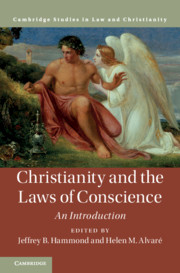Book contents
- Christianity and the Laws of Conscience
- Law and Christianity
- Christianity and the Laws of Conscience
- Copyright page
- Dedication
- Contents
- Contributors
- Acknowledgments
- Introduction
- Part I Themes in Understandings of Conscience in Christianity
- Part II Conscience According to Major Figures and Traditions
- 5 Conscience in the Early Church Fathers
- 6 St. Thomas Aquinas on Conscience
- 7 Reforming the Conscience
- 8 Toward a Theology of a Redeemed Conscience
- 9 Pierre Bayle
- 10 Freedom of Conscience and Its Right to Constitutional Protection
- 11 Jonathan Edwards on Conscience
- 12 Obeying God Rather Than Men
- 13 Mormonism and Conscience
- 14 Culture and Conscience in the Thought of Joseph Ratzinger, Pope Benedict XVI
- Part III Applied Topics in Law and Conscience
- Index
- References
13 - Mormonism and Conscience
from Part II - Conscience According to Major Figures and Traditions
Published online by Cambridge University Press: 12 June 2021
- Christianity and the Laws of Conscience
- Law and Christianity
- Christianity and the Laws of Conscience
- Copyright page
- Dedication
- Contents
- Contributors
- Acknowledgments
- Introduction
- Part I Themes in Understandings of Conscience in Christianity
- Part II Conscience According to Major Figures and Traditions
- 5 Conscience in the Early Church Fathers
- 6 St. Thomas Aquinas on Conscience
- 7 Reforming the Conscience
- 8 Toward a Theology of a Redeemed Conscience
- 9 Pierre Bayle
- 10 Freedom of Conscience and Its Right to Constitutional Protection
- 11 Jonathan Edwards on Conscience
- 12 Obeying God Rather Than Men
- 13 Mormonism and Conscience
- 14 Culture and Conscience in the Thought of Joseph Ratzinger, Pope Benedict XVI
- Part III Applied Topics in Law and Conscience
- Index
- References
Summary
Rosalynde Welch and Nathan Oman describe how the Church of Jesus Christ of Latter-day Saints has deployed conscience. Distinguished from many Protestant accounts of conscience, the church’s account does not focus on conscience as choosing by the self. Instead, it relies on externally provided, yet personally received revelation – whether available to all (“light of Christ”) or more exclusive (“gift of the Holy Ghost”). Though the church values personal revelation, interpretations and decisions by the church hierarchy prevails over conscientiously held beliefs of church members. Dissent is not unheard of in the church. For most of the nineteenth century, the church did not obey the anti-polygamy laws passed by Congress. Some resistance used language of conscience, while others identified outside forces – revelation, oracles, religious persecution, or the Constitution (which the church thought superior to mere laws) – as reasons to resist the federal government. Recently, in the case of Bishop v. Amos, the church based its liberty claim on its interest in running its own affairs. Regardless, the church generally has prized fealty to law over idiosyncratic conscientious resistance.
Keywords
- Type
- Chapter
- Information
- Christianity and the Laws of ConscienceAn Introduction, pp. 245 - 264Publisher: Cambridge University PressPrint publication year: 2021

